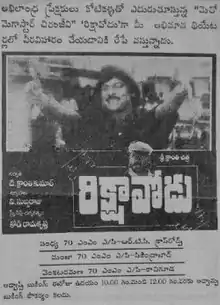Rikshavodu
Rikshavodu (transl. Rickshaw puller) is a 1995 Telugu film starring Chiranjeevi, Nagma and Soundarya in lead roles, directed by Kodi Ramakrishna and produced by Kranthi Kumar. Chiranjeevi played a dual role in the film. It was dubbed in Hindi as Devaa The Power Man and in Tamil as Veeraputhran.[1]
| Rikshavodu | |
|---|---|
 Theatrical release poster | |
| Directed by | Kodi Ramakrishna |
| Produced by | Kranthi Kumar |
| Starring | Chiranjeevi Nagma Soundarya Jayasudha Manorama |
| Music by | Raj-Koti |
Release date | 14 December 1995 |
| Country | India |
| Language | Telugu |
Plot
Chiranjeevi has enacted a dual role in this film. The film opens with a scene where Chiranjeevi come to the city in search of a livelihood with his grandmother Manorama. He is befriended by Brahmanandam and taken to Soundarya, who rents rickshaws. One day while driving passengers in his rickshaw, he has a confrontation with Nagma, who hit it by driving her car aggressively. He files a suit against her in the court, but fails due to the influence of Nagma's wealthy father Paresh Rawal. After some scenes, Paresh Rawal forces his daughter to marry Chiranjeevi to build up his political career as Chiru has a good mass following in his area. Manorama sees Paresh and then reveals his past. His father (also Chiranjeevi) a good human being and also a village head. Envied by the good name he has in the village, Paresh Rawal traps his sister and sees that she commits suicide and also blames his wife Jayasudha that she is illicit. He kills Chiranjeevi in a village fight and that blame is taken by Jayasudha and she is in jail and all the villagers think that she is the actual cause of all this. Now the son takes revenge on the villain and opens the truth before the villagers. Also Nagma transforms into his loving wife after knowing her fathers' deeds.
Cast
- Chiranjeevi as Raju & Dharma Rayudu (dual role)
- Nagma as Rani
- Soundarya as Narsakka
- Jayasudha as Raju's Mother
- Manorama as Bamma
- Brahmanandam as Ramakrishna, Raju's Rickshaw Friend
- Paresh Rawal as G. K. Rao
- A.V.S as G. K. Rao's Assistant
- Gundu Hanumantha Rao
- Subbaraya Sharma
Music
Music scored by Raj and Koti; Lyrics penned by Veturi Sundararama Murthy and Bhuvana Chandra.
| No. | Title | Singer(s) | Length |
|---|---|---|---|
| 1. | "Ne Petta" | S. P. Balu,Chithra | |
| 2. | "Ardha Rathri" | Sujatha, S. P. Balu | |
| 3. | "Chick Chiklet" | Baba Sehgal, Sujatha | |
| 4. | "Devudyna Jeevu" | S. P. Balu | |
| 5. | "Pa Pa Edirinpa" | S. P. Balu | |
| 6. | "Entabba Taku" | K. S. Chithra, S. P. Balu |